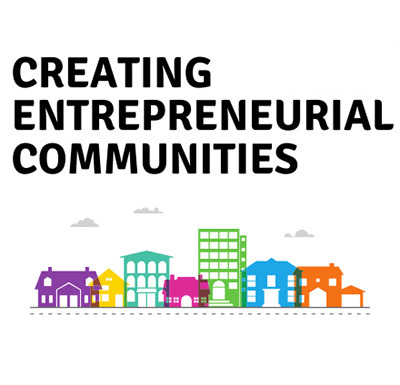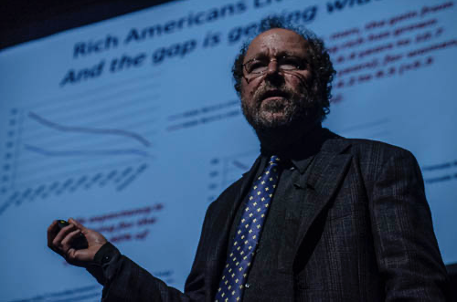Issues and Analyses: Promoting Creative Economic Development In Amherst

Photo: missouri.edu
By Gerald Friedman and Maral Asik
This is part three in our series, Economics In A Small College Town. Part 1 can be found here. Part 2, If We Build It Will They Come?, can be found here.


Going back to Adam Smith as well as Jane Jacobs and our reigning urban development economist Richard Florida, we find that creativity in the development of better production techniques or consumer products is the key to economic growth. And that creativity is best sponsored through human interaction: the division of labor, communication, and cooperative learning. The concentration of cooperative learning opportunities explains the advantage that narrow geographic areas have in developing high value-added industries even in the face of high rents and great demand for location.
The most productive industries are also the most concentrated geographically. Despite the high cost of doing business in crowded locations, tech remains concentrated in Silicon Valley and San Francisco, for example, because much of the cooperative learning essential for these dynamic industries happens there, in ethnic enclaves (e.g. the region’s South Asian community), and in a few social venues popular among young techies. In New York City’s fashion industry and its diamond district, cooperative learning also happens in small districts, particularly in ethnic enclaves and in social venues. Despite the high cost of rent and other expenses, Los Angeles and New York dominate the music and entertainment sectors, and New York dominates finance. In each of these cases, major industries are concentrated in urban enclaves because of the creative synergies of concentrations of industry professionals who are in close proximity, and have opportunities to communicate and build ideas.
To build a vibrant entrepreneurial community, Amherst needs to provide opportunities for entrepreneurs to interact, to learn from each other, and to start businesses in small-scale and low-cost venues.
Gerald Friedman and Maral Asik
If Amherst is to flourish economically, it needs to emulate what these entrepreneurial centers do to promote learning synergies, and we will need to do this through conscious intervention because too little happens spontaneously. To build a vibrant entrepreneurial community, Amherst needs to provide opportunities for entrepreneurs to interact, to learn from each other, and to start businesses in small-scale and low-cost venues. Entrepreneurial communities have been built in places like Boulder, Colorado; Kansas City, Missouri; Burlington, Vermont; and nearby Northampton through myriad social interactions where new entrepreneurs can share experiences, learn from each other, and even provide market opportunities to help each other. We know some characteristics of successful creative communities: they are diverse culturally, they are highly educated, they are open to new ideas.
Clearly, Amherst has advantages in these areas with a highly educated and diverse population. What we lack are the venues for entrepreneurs to interact, to start, and to grow slowly. And construction projects that tear down small venues and replace them with larger, high rent ones undermine the type of economic development that Amherst needs.
What Can Local Governments Do?
There are, of course, limits on what local governments can do to promote this type of entrepreneurship. But we know some things that do not work and we should stop doing them. National businesses are the enemy of local entrepreneurship because whatever learning happens in these stores stays within their national structure, and because national chains purchase nationally, thus contributing little to local markets for business services.
Local entrepreneurial communities flourish together, and are inhibited by a proliferation of these self-contained national businesses, and local governments can use their zoning power to favor the smaller business locations favorable to a variety of smaller local businesses. Such locations are particularly helpful for small local businesses who need to start in low rent locations but also benefit from opportunities to grow in stages. Successful entrepreneurial communities are built from the ground up by local residents starting with small businesses. Stores on the relatively successful entrepreneurial community along Main Street, Northampton are smaller than those in Amherst, averaging 23 feet storefront versus 30, and Northampton, especially within Thornes Marketplace, provides the type of small venues that entrepreneurs need. We need more of those small spaces to provide opportunities for local people to start businesses, and a variety of offices and shops of different sizes can help new businesses begin and grow.
While local government cannot by itself create the community learning environment favorable to entrepreneurship, it can create opportunities for such a community to grow. Even simple social gatherings, like weekly coffee klatches sponsored by local governments, Chambers of Commerce, or other agencies can promote the type of learning, exchange, the creation of local networks that “thicken over time” and provide mutual assistance to local entrepreneurship.
Local governments can also provide technical assistance, filling a gap in support sometimes lacking for small start-up businesses. This assistance can include business plan development and assistance in identifying accounting, finance, legal services. While these are often available in the private sector, emerging businesses may be unaware of opportunities, even unaware of their need. They may also lack the scale needed to support buying such services in the private market. Local government staff may also help to supplement such work by connecting new entrepreneurs with mentors who are experienced entrepreneurs. Such assistance may help to make the town itself an incubator, fostering new and creative economic development by harnessing the community’s abundant talent.
Boulder Promotes Entrepreneurship
While such a program may sound utopian for a small town like Amherst, it has worked in other locales. The city of Boulder, Colorado, for example, with a population of about 106,000, has become a center of economic growth in the region through such a program of promoting entrepreneurship. Dubbed the “Boulder thesis” by venture capital investor and business scholar Brad Feld, a program like this, originating in the University of Colorado but backed by the city government and led by the entrepreneurs themselves, has successfully transformed the Boulder business community by fostering the growth of new and exciting businesses. Community engagement has been the key with continual activities to connect potential entrepreneurs with existing business leaders, investors, and consumers.
Building Entrepreneurship From The Ground Up
What should Amherst do to support creative entrepreneurship? Building entrepreneurship from the ground up, the Town itself is not responsible for the heavy lifting. That is to be done by the entrepreneurs themselves and those providing mentorship. The Town’s contribution could be vitally important, however, in four areas:
- Promoting communication and sociability across communities. Amherst entrepreneurs will be drawn from the area’s business, creative, and intellectual communities, including many who would not necessarily cross paths in their normal lives. The Town can promote contacts by sponsoring coffee times, maybe dinners, and other social events where people can meet and discuss their ideas. There is a small investment here (coffee, a room, dinner) and a large investment in a staff person to coordinate activities and maintain contacts.
- Maintaining relations with UMass incubators. UMass has a plethora of business and other clubs preparing students for entrepreneurship. Town staff could promote contacts between those budding entrepreneurs and mentors, as well as other connections in the community.
- Encouraging landlords to maintain a diverse stock of office and retail space. This is one of the great contributions of Thornes Market in Northampton, providing a wide variety of spaces where businesses can begin, incubate, expand, and grow still larger. Amherst might consider particular zoning regulations or add requirements for new construction to include a variety of spaces.
- Providing adequate infrastructure. Businesses need good, inexpensive, and reliable Internet access. Amherst has expensive and not always fast Internet courtesy of Comcast.
Programs like these are in keeping with the finest traditions of Amherst and New England. They built on our democratic heritage by recognizing how every member of our community can contribute to revitalizing our local economy. Using our own resources, the creative talent we have, Amherst can be more than restaurants and student bedrooms. We can provide expansive economic opportunities and promote exciting businesses and technologies. What it needs is to turn its focus from constructing buildings to building a creative community.
Gerald Friedman is Professor of Economics at the University of Massachusetts. He graduated from Columbia College in 1977 and earned a Ph.D. in economics from Harvard University in 1986. His most recent book, The Case for Medicare for All, appeared in March 2020 with Polity Press. Follow him on twitter at @gfriedma
Maral Asik is originally from Longmeadow and is a freshman at UMass Amherst participating in the Economics Undergraduate Research Assistant Program. She is interested in economics, international relations, and environmental studies.
Issues & Analyses is an occasional feature of The Indy offering longer articles that take a deep dive into a subject in order to help readers understand some of the complex issues facing this town and the mechanics of municipal government. If there is an issue in municipal government that you would like us to take on in these columns, please send your suggestions to amherstindy@gmail.com

1 thought on “Issues and Analyses: Promoting Creative Economic Development In Amherst”